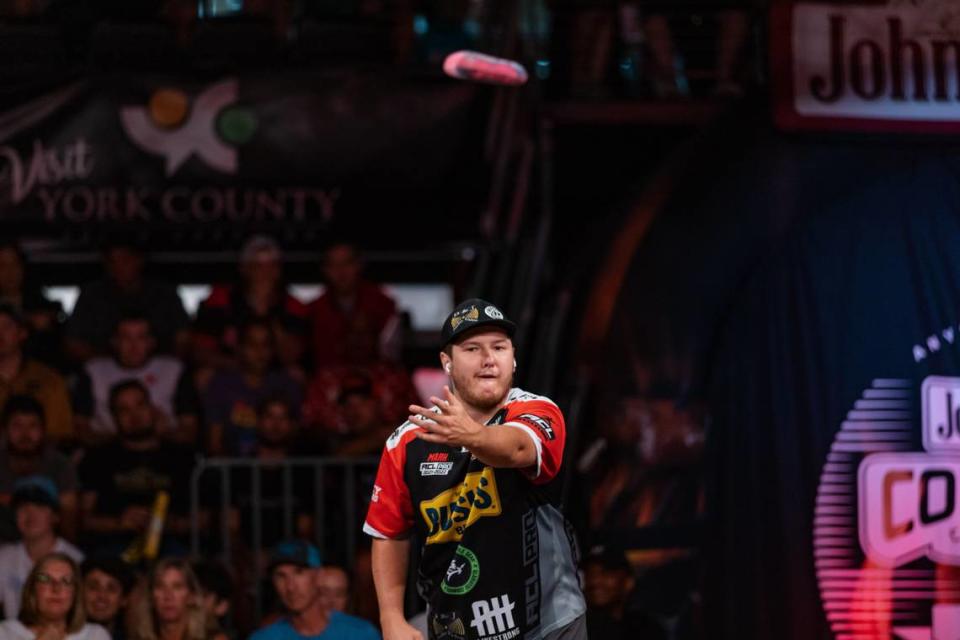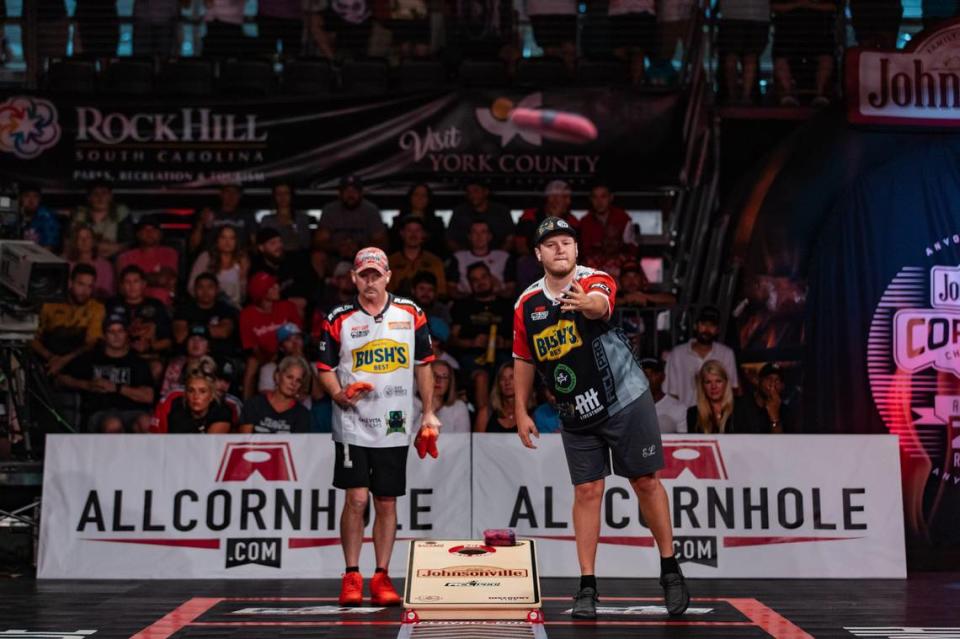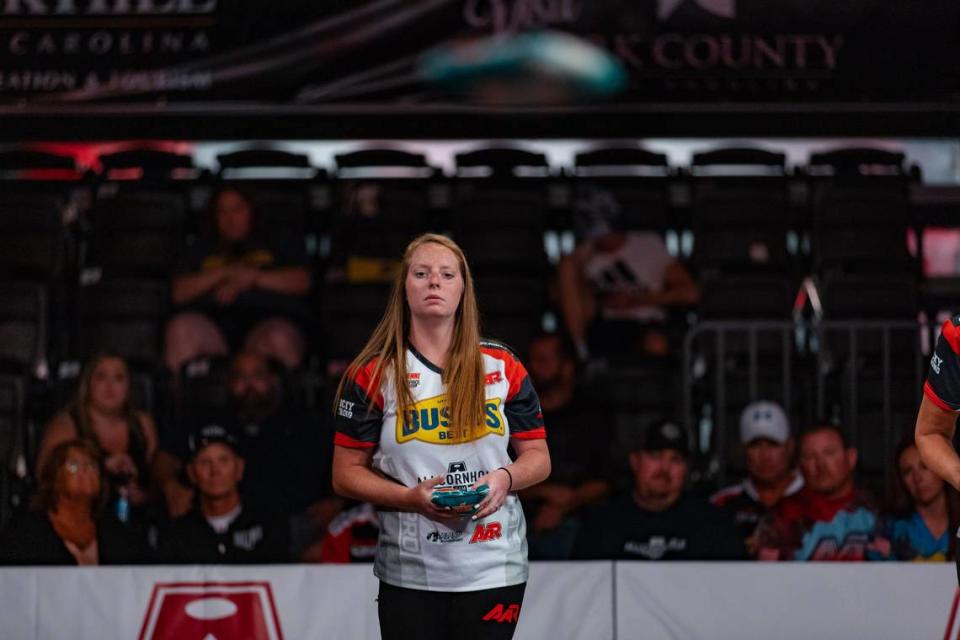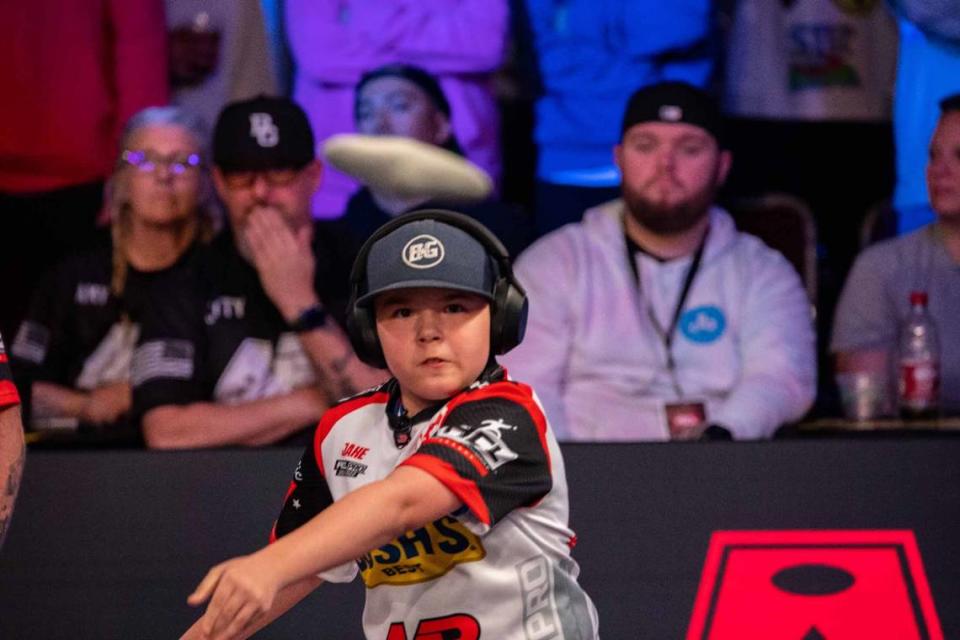Professional cornhole aims to put cheating scandal in the past at Rock Hill tournament
If all that you know about cornhole comes from tailgates and backyard barbecues, then Stacey Moore has some facts he’d like to share with you.
The American Cornhole League commissioner has watched the sport grow from a league he founded in 2015 to professionalize tossing beanbags at two slanted boards into something that he now is lobbying to become an Olympic sport by 2032.
The number of people competing in his cornhole league has increased 40 fold since its inception, and the prize money is 160 times greater, now totaling $8 million. This week’s ACL World Championships in Rock Hill, S.C., will be broadcast on ESPN for the seventh straight year, with CBS Sports adding coverage for a third year. Moore, a Charlotte native, moved his league’s headquarters to Rock Hill in 2021.
The league’s slogan is, “Anyone can play, and anyone can win,” and fans are drawn to both the familiarity and novelty of the sport.
“There’s a little bit of a ‘wow’ factor and you have that relatability,” Moore said. “We’ll hear people say, ‘Hey, I tuned into this as a joke, but I kind of got sucked in.’”
But if all that you know about cornhole comes from watching last year’s World Championships and reading provocative news reports about one moment in that tournament that surfaced three months later, then Moore has a clarification for you.
The cornhole cheating scandal known as “BagGate” was neither cheating nor a scandal, he says, and he bristles at the suggestion that anything nefarious happened on the sport’s biggest stage at the Rock Hill Sports & Event Center.
“It was blown out of proportion,” Moore said. “From our perspective, it never was an issue.”
Still, it was enough to throw the cornhole world into a tizzy for weeks and lead the league to invest in a state-of-the-art, laser bag-scanning technology that it hopes will prevent even a whisper of impropriety in the future. A sport rapidly on the rise is looking to put last year’s kerfuffle behind it.
“It’s essentially one of those things that just wasn’t a great look for the sport,” said ACL spokesperson Trey Ryder.

The growth of cornhole
For anyone who hasn’t been to a tailgate recently, cornhole is a staple of those who like to play a game with a beverage in one hand. Two players alternate tossing beanbags toward slanted boards 27 feet away, attempting to throw a bag into a 6-inch hole in the board (and if a throw lands directly in the hole without touching the board, it’s called an “airmail” shot). Players are awarded between 0 points (for not landing on the board) to 3 points (for a bag directly in the hole), with the first to 21 points winning.
The growth in the popularity of cornhole is rooted in one truth and one event. First, there’s the simple fact that cornhole is accessible to large swaths of people. All it takes is two boards and a handful of beanbags to play. A set of boards can cost $200-500, while a set of bags costs $40-100.
No special physical attributes are necessary.
“You don’t have to be 7-foot tall. You don’t have to be this big, buff person,” said Mark Richards, ACL’s No. 1 ranked player, who calls himself an “undersized” basketball player who found a new competitive outlet. “Really it just takes working on your hand-eye coordination, working on that muscle memory.”
RELATED: Celebrate obscure sports as ESPN 8: The Ocho returns to the Charlotte area.
But what made it truly explode in popularity is one moment that no one had any control over: the pandemic.
After every professional sports league shut down, the ACL adjusted its rules to make players even more socially distanced than the 27 feet between boards. Players wore masks and face shields, and cornhole was the first American sport back on television in 2020.
“It was really intense, but we were the only thing on television,” Ryder said. “So ESPN was showing us four hours a day, and it was incredible.”
ACL’s TV deal with ESPN helps fund the league, along with sponsorship and licensing deals that bring in money. Key sponsors include Johnsonville and Bush’s Beans, while ACL-licensed boards and bags are on the pricier side of the cost range.

Richards, 26, said he started playing just before COVID, getting hooked simply by watching hours of YouTube videos that taught him strategy and technique. He spent his days teaching physical education at a school in Indiana, then would come home and study his new passion, learning the correct angle to land an “airmail” shot and how to rotate bags sideways for something like a “roll” shot.
“For six months straight, my nights consisted of watching three, four hours of cornhole,” he said.
Once he put his research into practice, Richards discovered he was really good at it. He was last year’s pro singles champion and finished second in pro doubles with partner Philip Lopez.
Richards still teaches gym class, but with the prize money he earns by regularly winning pro singles and doubles tournaments — where the top money can be $8,000-20,000 — combined with sponsorship deals, he doesn’t have to. Top players can make $250,000 with cornhole winnings, sponsorships and endorsement deals.
“To be straight-up honest with you I’m really teaching just to basically earn benefits,” Richards said. “Another reason is just to get my mind off of cornhole every once in a while. Obviously, it’s on my mind every single day, but it is nice to take some breaks.”
It was a good distraction when Richards was at the center of BagGate last November.

BagGate hits cornhole
What ACL officials want to make clear is that bag challenges happen all the time. Any player is allowed to ask for an opponent’s bags to be checked that they’re in compliance before a match begins.
Every bag of resin beads, by ACL rules, must be 6 by 6 inches when laid flat, and weigh 16 ounces.
But every cornhole player also goes to great lengths to break in their bags before using them in play, and that means the shape can sometimes shift. The trick is to break in bags enough to use them in games, but not too much to be outside of what’s allowed.
Some will tumble them in an unheated dryer. Some will boil them. Others pour over fabric softener, conditioner or a special bag fabric relaxer made specifically for the purpose of breaking in the fibers. All of that allows bags to be more pliable and better suited to the game.
“No pro wants to throw a bag that’s brand-new because they’re stiff,” Richards said. “They’re not ‘hole friendly.’ There’s a new shot called the ‘roll shot’ and ‘cut shots’ — you’re not able to do that stuff if you have a brand-new bag.”
In a quarterfinal doubles match of last year’s World Championships, a player on the No. 6 ranked team asked for a bag check on Richards and Lopez’s bags before the match began. It was the only time that happened in the championship tournament, Moore said, and maybe the fifth bag check all season. Measuring tools — including a clear plastic frame in the shape of a squat “H” that measures height and width of bags — were brought out, and the bags failed inspection.
But Richards and Lopez then asked for a bag check on the bags of their opponents, Devon Harbaugh and Derrick King. Their bags failed inspection, too.
After about an hour delay, both teams agreed to play on, despite the measurements being off.

Cornhole players shrugged it off as simply a part of the game, something that occasionally happens but doesn’t cause much concern.
“At the time, I was ready to play my game,” Richards said. “It stopped. I went over to my dad to just converse with him about Notre Dame basketball and then got back to the game. So I really don’t have an opinion.”
But onlookers and viewers of the livestream were scandalized.
“They’re too small,” color commentator Mark Pryor exclaimed on the broadcast. “That’s going to create some drama.”
“I will say that the process that happened to test the bags on site was a bit chaotic,” Moore admitted. “And the person that normally would have tested the bags was not immediately available, so someone stepped in that had not done a bag test yet. Things just kind of unraveled within the crowd and people were starting to yell things and this and that.”

A 3D laser machine
Still, it didn’t turn into a major story until the Wall Street Journal wrote about BagGate in November 2022. Other media outlets picked it up and began demanding answers from both players and ACL officials. Moore had to issue a statement reiterating that no bags were deemed illegal.
“My pros were getting calls from ‘Inside Edition,’ (asking), ‘Are you going to go on and defend that you were using illegal bags?’” said Ryder, who also does color commentary on broadcasts. “It was just a tough time for us. We got through it, but I just don’t love to talk very much publicly about it, just because it wasn’t a great week for us.”
Months later, ACL is ready to move on to a new World Championship tournament and put BagGate behind it. And although officials say the scandal was blown out of proportion, ACL has taken steps to create a system that will more accurately determine whether bags are in compliance well in advance of matches.
The league invested $150,000 in a 3D laser machine, Moore said, that will automatically determine whether a bag is the right size and weight. It’s expected to be used next season.
“We continue to evolve our policies and get more technical with our bring-your-own bag policy,” Moore said. “Having so many different bag manufacturers out there, our testing process and monitoring of cornhole bags is going to continue to evolve and get more scientific.”
The evolution of the sport is trying to keep pace with its rapid growth. In its first year, about 5,000 players participated in 1,500 events that paid a total of $50,000 to top finishers. This year, about 200,000 players have played in 25,000 events with $8 million in prize money. The sport is trying to grow its international footprint so that it can be an Olympic sport soon, and will need 75 countries fielding teams for it to be considered.
That’s why a lot is on the line at this year’s World Championships. ACL’s deal with ESPN is up after this tournament. Good ratings and continued popularity are essential.

Richards is defending his singles title and hoping to capture the doubles crown this year, too. A 14-year-old phenom named Jakob Gore from Concord has drawn attention for his enthusiasm and energy. Gore and his twin brother, Jack, started playing when they were 4. Jakob Gore began competing against and beating adults when he was 9, turned pro when he was 10 and now is the fifth-ranked player in ACL. He’s been home-schooled for the past year so he can focus on honing his game to topple adults who are often more than twice his age.
“I like it because they don’t expect to lose to a kid,” Gore said.
Like the slogan says, anyone can play and anyone can win.
As long as the bags are in compliance.
Want to go?
American Cornhole League World Championships
Where: Rock Hill Sports and Event Center, 326 Technology Center Way, Rock Hill, SC 29730
When: Through Aug. 6. Finals include: Pro Teams on Aug. 1 at 9 p.m.; Pro Doubles on Sat. Aug. 5 at noon; Pro Singles on Sun. Aug. 6 at 1 p.m.
Tickets: Range from free to $20 per person, depending on event.
More information: www.iplaycornhole.com/event/22-23/national/world.

 Yahoo Autos
Yahoo Autos 